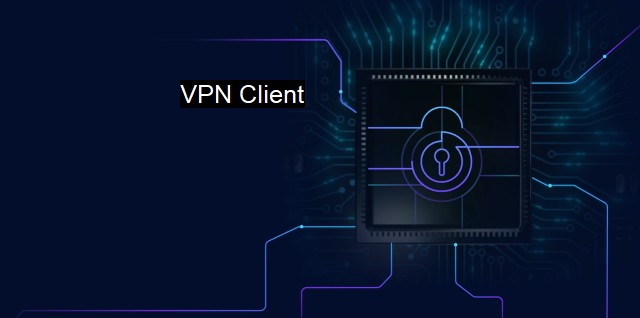What is VPN Client?
The Vital Role of VPN Clients in Securing Your Cyber-World: Safeguarding Your Data and Privacy Against Cyber Attacks and Threats
A VPN, or Virtual Private Network client, is a kind of software that establishes a safe and encrypted communication link between your device and the VPN server. This technology originated as a way to connect business networks securely over the internet or allow users access to a business network from home. Today, it is getting more attention not just among corporate users, but among the general public as well, due to rising concerns about personal privacy and cybersecurity realms.Conceptually, the VPN client's functionality is likened to that of a protective tunnel. This client, signifying the user end of the VPN tunnel, is installed on the device providing user access and creates this protective tunnel to the VPN server. Utilizing encryption methodologies, it provides methods to ensure that data transmitted between the user and the VPN server cannot be intercepted by third parties. This is particularly useful when using unsecured networks, like public Wi-Fi hotspots, where the data transmitted may include potentially sensitive information such as usernames, passwords, or credit card information, rendering the user vulnerable to cybercrime exploits.
Broadly, the VPN client supports different applications on the device for their need to access the internet. It is available for numerous operating systems and can be hardware or software-based. Advanced VPN clients incorporate settings to ensure anonymity, circumvent geographical restrictions, offer protection against malicious sites, and block intrusive advertising. As part of these settings, some clients offer a "kill-switch" that blocks all outgoing net connections if your VPN connection drops, thus providing an added layer of protection by not allowing data transmission over an unsecure network.
In terms of enhancing cybersecurity, the VPN client has a significant role. It's vital to consider that, apart from encrypting the data, it also changes one's IP address to that of the VPN Server. This masks your own IP address and makes your online interaction appear to originate from a different location to assist in maintaining anonymity. With the revelation of increasing numbers of security breaches the rising significance of VPN clients cannot be underestimated to retain confidentiality and digital safety.
When paired with adequate antivirus software, the VPN client can play an instrumental role in significantly lowering the risks of cyber threats. While a VPN client encrypts data to protect information from data interception during transmission, antivirus software's role typically detects and eliminates malware before they infect your device. They are designed to guard you against a range of internet threats as viruses, Trojans, ransomware, phishing scams and adware. Importantly, they provide real-time protection, alerting and acting immediately if any potential threats are detected.
That being said, while VPN clients increase cybersecurity, they are not a panacea. It is essential to understand that they do not prevent access from malware, viruses, or other threats that may be already existing on your device or that which you unknowingly download. This is where antivirus software steps in to function in tandem by offering complementary protection, hence, the repeated advice on employing both VPN client and antivirus software to ensure comprehensive protection when engaging in online activities.
a VPN client provides dual functionality, ensuring privacy by masking real IP Addresses and providing an encrypted tunnel thus dramatically reducing the opportunity for malicious interception. As digital threats continue to grow, the relevance of VPN clients increases exponentially, and their utilization is expected to be more prevalent in the future. Meanwhile, antivirus software runs parallel, alerting and acting against the actual threats invading your hardware. Together, they form a formidable defense mechanism against potential digital threats, signaling the importance of investing in them to reap the benefits of secure cyber interaction.

VPN Client FAQs
What is a VPN client?
A VPN client is a software application that allows you to connect securely and privately to a virtual private network (VPN). It encrypts your internet traffic, makes your online activities anonymous, and protects your data from cyber threats.Why do I need a VPN client for cybersecurity?
You need a VPN client for cybersecurity because it encrypts your online traffic and hides your IP address, making it difficult for hackers, ISPs, and governments to spy on your internet activities. It also prevents you from accessing malicious websites and phishing scams.Does a VPN client come with antivirus protection?
Most VPN clients don't come with antivirus protection. However, some VPN providers offer bundled packages that include both VPN and antivirus protection. It's important to choose a reliable VPN provider that also offers reliable antivirus software for complete security.Is it legal to use a VPN client?
Using a VPN client is legal in most countries. However, some countries like China, Russia, and Iran have banned the use of VPNs or restrict their use to government-approved providers. It's important to check the laws and regulations of your country before using a VPN client.| | A | | | B | | | C | | | D | | | E | | | F | | | G | | | H | | | I | | | J | | | K | | | L | | | M | |
| | N | | | O | | | P | | | Q | | | R | | | S | | | T | | | U | | | V | | | W | | | X | | | Y | | | Z | |
| | 1 | | | 2 | | | 3 | | | 4 | | | 7 | | | 8 | | |||||||